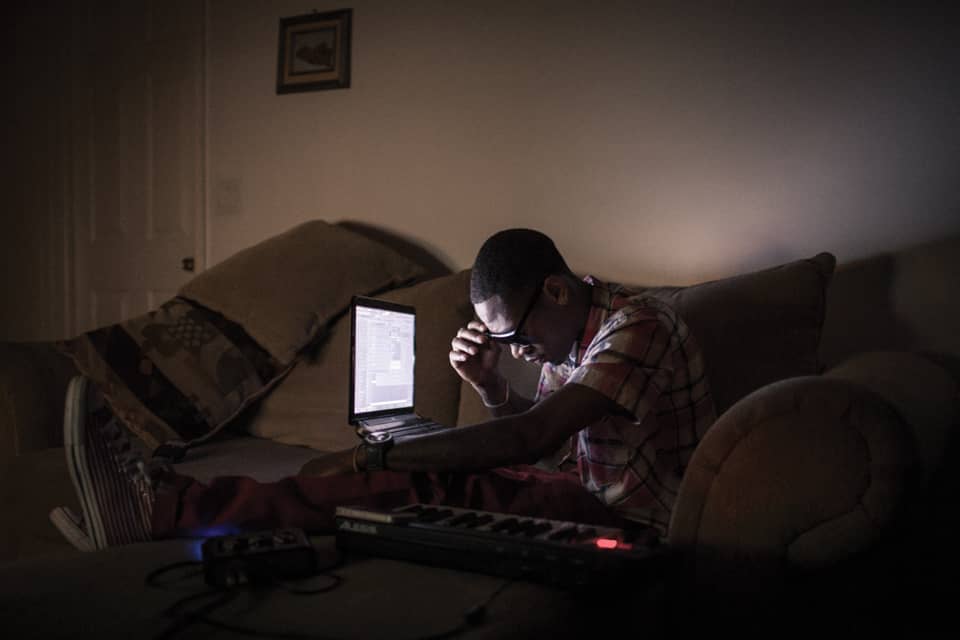Four very different producers define the sound of rap's future.
Two years ago, Waka Flocka Flame released his debut album, Flockaveli. Of its 17 songs, 11 were produced or co-produced by Lex Luger, a Virginia teenager he’d met on the internet. The two were peas in a pod, Waka’s good-natured aggressiveness matched by Luger’s jackhammer drums, gunshot sounds and spooky synthesizers. It was a new kind of bombast, and Luger was prodigious, supposedly averaging just 20 minutes to produce a beat, even if they were mostly variations on a theme. On Rick Ross’ 2010 album Teflon Don, Luger produced the beats for “MC Hammer” and “B.M.F.,” the album’s two most crushing tracks. While not exactly identical in sound, they are inarguably fraternal. After his songs with Waka and Ross became ubiquitous in clubs and on the radio, Luger’s handiwork was highly sought after, and he churned out countless hits. His distinctly loud, southern sound began to truly embody a time in hip-hop. Eventually, the demand for Luger’s beats became higher than the supply, and other producers simply aped his style. Waka’s second album features just one Luger production, but from the sound alone, you’d think he was still omnipresent.
Beyond originality, perhaps Luger’s style became so popular because it coincided with a key moment in social media and online sharing. The idea of a regional sound, the niche to which Luger’s beats may have once been relegated, no longer exists. Like any genre, today’s rap cannot be defined by just one trend at any given time, which is why we’ve chosen four new producers from four different parts of the country—Mike Will Made It from Atlanta, DJ Mustard from LA, Paris Beuller from Chicago and Chuck Strangers from New York—whose sounds have as much in common as they do not. Will’s beats feel like they’re from outer space, a Technicolor extension of his Atlanta forefathers in the Dungeon Family. DJ Mustard uses a Luger-like exoskeleton, filling it with dry drums and slowing it down to a singsong. Paris Beuller, not yet feeling the spotlight like many of his peers in Chicago, is making some of that city’s most grandiloquent music. And Chuck Strangers is a young Brooklyn producer seemingly born in the wrong era, wrestling with his love of a classically organic New York City sound. All of their styles define a time and a place. If they’re lucky, like Luger, they’ll come to define a moment.
MATTHEW SCHNIPPER
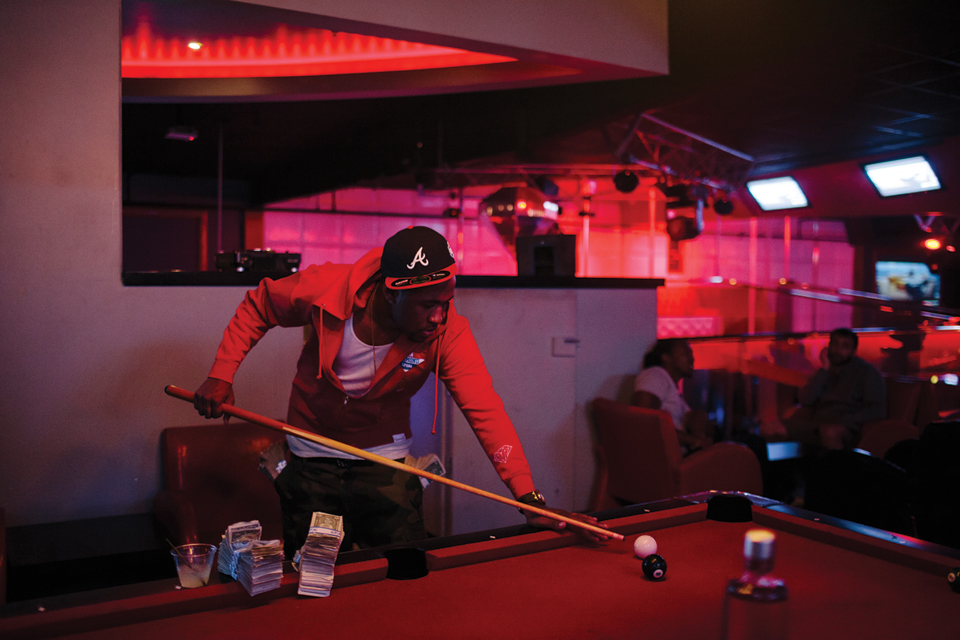
LOCATION: Atlanta, GA
AGE: 23
GEAR: Logic, FL Studio, Motif, Fantom
NOTABLE BEATS: Juicy J, “Bandz A Make Her Dance”; Future, “Turn On The Lights”; 2 Chainz f. Drake, "No Lie"
SIGNATURE SOUND: Stirring, ornate party music with synth melodies on top of knocking 808s
WHAT TO EXPECT IN THE FUTURE: R&B singles with Brandy and Kelly Rowland, tracks for Young Jeezy and continued collaboration with Kanye West, Future, Gucci Mane and 2 Chainz
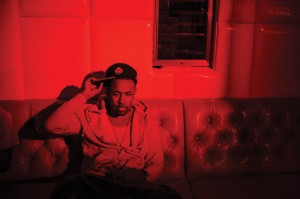 Mike Will’s inroads with Atlanta’s rap royalty were early and charmed. At 16, hanging around Midtown’s PatchWerk studios, he sniffed out Gucci Mane and handed him a CD of instrumentals. “Next thing you know, he sees me in the hallway and he’s like, ‘Yo, you, shorty with the beats. Come listen to this song I wrote.’” Over summer vacation, the two spent three marathon days in the studio, Will crafting stripped-down, locally legendary tracks like “East Atlanta 6.” Three years later, in 2011, Will dropped out of Georgia State University after just five semesters. “I didn’t have no college friends,” he says. “All the artists the college folks were listening to were my homies. I was leaving class, literally, to record with them.”
Mike Will’s inroads with Atlanta’s rap royalty were early and charmed. At 16, hanging around Midtown’s PatchWerk studios, he sniffed out Gucci Mane and handed him a CD of instrumentals. “Next thing you know, he sees me in the hallway and he’s like, ‘Yo, you, shorty with the beats. Come listen to this song I wrote.’” Over summer vacation, the two spent three marathon days in the studio, Will crafting stripped-down, locally legendary tracks like “East Atlanta 6.” Three years later, in 2011, Will dropped out of Georgia State University after just five semesters. “I didn’t have no college friends,” he says. “All the artists the college folks were listening to were my homies. I was leaving class, literally, to record with them.”
“Tupac Back,” Will’s thunderous breakout single for Meek Mill and Rick Ross, dropped the semester he left school. A year and a half later, Will simultaneously had three songs on Billboard’s Hip-Hop Top 10. United by dizzying drum programming, Will’s singles suggest a new brand of crossover street rap, something related to crunk but not as brutal. “It’s shit that you can bump, but that both males and females are gonna bump,” he says. “Something that makes people wanna move, whether it’s slow or fast.”
Will’s strangest and often most exciting tracks are big, sentimental ballads masquerading as rap songs, like “Just a Sign,” a six-minute Auto-Tune serenade for B.O.B., or Future’s “Turn on the Lights,” which highlights the rapper’s passionate warble alongside a swirl of keys. “It’s all about getting somebody to recognize your vision,” he says. He’s done that pretty effectively, catching the attention of Kanye West, who sought out Will’s signature percussion for this summer’s “Mercy.” Once the tagalong kid with technical skill, at 23, he’s as much a director as he is a producer. “If I tell you purple look good on you, and you ain’t never wore purple, your favorite colors are red and green, and you’re like, No man, these my colors,” Will says, “you won’t know purple is your color until you try it on.”
NAOMI ZEICHNER
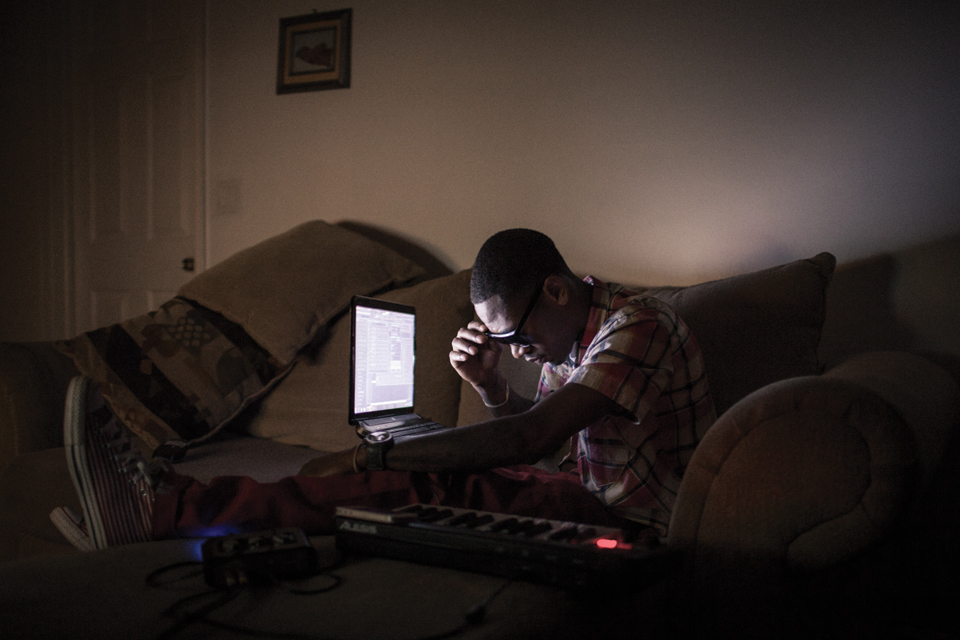
LOCATION: Chicago
AGE: 26
GEAR: FL Studio, Reason
NOTABLE BEATS: Lil Durk, “L’s Anthem”; Fredo Santana, “Wild Niggas”; Paris Beuller f. Shawnna, “Top and Bottom”
SIGNATURE SOUND: A southern take on Chicago’s relentless drill music
WHAT TO EXPECT IN THE FUTURE: Continued work with Chicago artists, a BandKamp compilation and his own project as a rapper
Chicago’s drill music scene can often feel like a perpetual first day of summer—kids wilding everywhere and not really caring about who they piss off. It is a scene for kids, by kids; its most visible faces, like rapper Chief Keef and producer Young Chop, are barely old enough to buy the blunts they smoke. But there are some adults behind the scenes, like the producer Paris Beuller, who helmed the bulk of teenager Lil Durk’s I’m Still a Hitta, one of drill’s defining full-length statements.
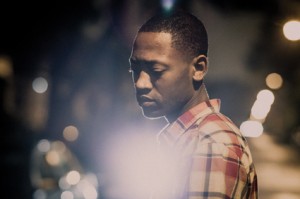 Beuller is 26, not old by many standards, but in the drill scene, the age gap can make him feel like he’s the babysitter: Beuller teamed with Chop when Chop was just 15, and he remembers Durk coming through the studio when he was in his early teens. Beuller, Chop and rapper Poo Mack formed the production collective BandKamp, and began to mold what would become the city’s signature sound: a hauntingly stark take on Lex Luger’s crunk revival that incorporates the musicality of mixtape luminaries like Drumma Boy and Zaytoven. “L’s Anthem,” Durk’s lead single for Def Jam, is a perfect example: Beuller coats jittery hi-hats in a fog of synths, including a high-pitched one that imitates a scream straight from a horror film.
Beuller is 26, not old by many standards, but in the drill scene, the age gap can make him feel like he’s the babysitter: Beuller teamed with Chop when Chop was just 15, and he remembers Durk coming through the studio when he was in his early teens. Beuller, Chop and rapper Poo Mack formed the production collective BandKamp, and began to mold what would become the city’s signature sound: a hauntingly stark take on Lex Luger’s crunk revival that incorporates the musicality of mixtape luminaries like Drumma Boy and Zaytoven. “L’s Anthem,” Durk’s lead single for Def Jam, is a perfect example: Beuller coats jittery hi-hats in a fog of synths, including a high-pitched one that imitates a scream straight from a horror film.
Things have moved fast in Chicago, with rappers and producers inking major label deals and stars like Kanye West and Drake jumping on remixes. But as youthful, reckless energy buzzes around him, Beuller remains the Chicago sage, wise beyond his 20s. “I don’t want to just be known as a Chicago producer, [there’s] a bigger picture to this,” he says. “We’re a movement, we could’ve been the next No Limit—I still see that. We’re creating a lane for ourselves.”
But all the attention and money can be gone in a snap—Beuller admits that there’s been a different vibe in the city since the murder of Lil JoJo, a Chicago teen rapper. JoJo, Beuller says, reached out to him a week before his death, looking to kick start his career. The producer told him that it could happen as long as he didn’t use the platform to further war with his rivals. “We have all the attention in the world right now,” Beuller says. “But we have to do it the right way.” Beuller helped create the hottest sound in rap—now he’s one of the few people left to protect it.
JORDAN SARGENT
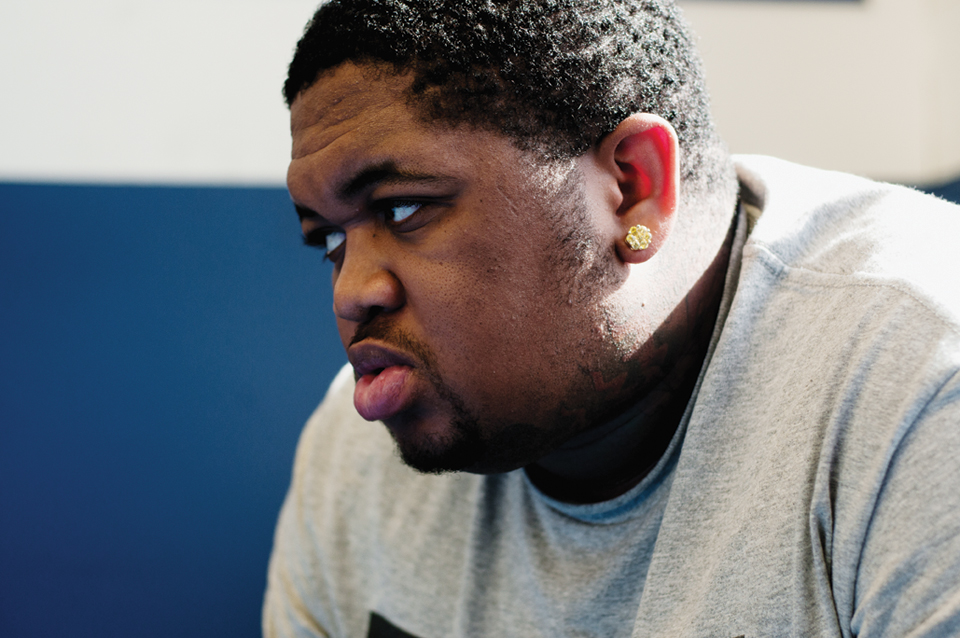
LOCATION: Los Angeles, CA
AGE: 22
GEAR: Reason, Fruity Loops
NOTABLE BEATS: Tyga, “Rack City”; 2 Chainz, “I’m Different”; YG, “I’m Good”
SIGNATURE SOUND: Minimalist, party anthems built on sparse synths punctuated by claps and snaps
WHAT TO EXPECT IN THE FUTURE: A mixtape, continued collaboration with Tyga, YG and 2 Chainz, and potential tracks for Future and Beyonce
DJ Mustard just wants you to have fun. If you were to listen to his range of production work—not only in the club, but, say, walking down the street—you might find a change in your gait. A strut takes over, shoulders roll to an inevitable finger snap. Mustard is perhaps best known for “Rack City,” the ubiquitous, slithering banger he produced for fellow Los Angeleno Tyga. The track blew up quickly; Mustard says he was shocked by its immediate success, but that he’s hoping the traction of his self-defined “ratchet” sound—a clinking, minimal style—will stay put. “Ratchet is like, just let your hair down… Like you off work and you can just have fun. Don’t be afraid to just dance, not worry about all the other stuff,” Mustard says. “When I got into producing, I just wanted to make something different. I took the jerkin thing, as an idea of making a movement, and tried to make my own movement with my own music. Ratchet is something from the streets.”
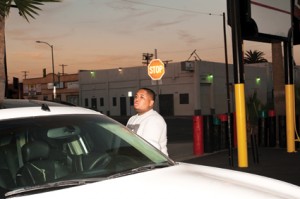 The fact that Mustard (whose real name is Dijon McFarlane) came up as a DJ in the youth-oriented LA jerkin scene helps explain the consistent danceability of his music and focus on pleasing the crowd. The teenage dance craze took the Los Angeles area by storm in 2009 and briefly spiked nationally, thanks in large part to some of the mesmerizing YouTube clips of kids dancing it inspired. The scene spawned a few hits and then quickly faded, left behind by casual listeners and the artists who came to feel like they’d outgrown it. While the movement was at its peak in 2009, Mustard, not yet a producer, cut his teeth spinning at high school jerkin parties. He’d first DJ’d at just nine years old, when his uncle, also a DJ, left young Mustard to man the booth. “DJing comes hand in hand with producing. You already know what the people want to hear when you’re DJing,” he says. “So when you’re making a beat, you’ve got that same feel for what people want to hear when they’re partying. And then all you need is somebody to come up with the right words, and you got a hit record.” Those right words, like Mustard’s productions, can be pretty simple: a track like “Rack City” is not about Tyga’s lyrics, but the staccato pronunciation that matches Mustard’s beat.
The fact that Mustard (whose real name is Dijon McFarlane) came up as a DJ in the youth-oriented LA jerkin scene helps explain the consistent danceability of his music and focus on pleasing the crowd. The teenage dance craze took the Los Angeles area by storm in 2009 and briefly spiked nationally, thanks in large part to some of the mesmerizing YouTube clips of kids dancing it inspired. The scene spawned a few hits and then quickly faded, left behind by casual listeners and the artists who came to feel like they’d outgrown it. While the movement was at its peak in 2009, Mustard, not yet a producer, cut his teeth spinning at high school jerkin parties. He’d first DJ’d at just nine years old, when his uncle, also a DJ, left young Mustard to man the booth. “DJing comes hand in hand with producing. You already know what the people want to hear when you’re DJing,” he says. “So when you’re making a beat, you’ve got that same feel for what people want to hear when they’re partying. And then all you need is somebody to come up with the right words, and you got a hit record.” Those right words, like Mustard’s productions, can be pretty simple: a track like “Rack City” is not about Tyga’s lyrics, but the staccato pronunciation that matches Mustard’s beat.
Mustard has spent the past couple of years honing his sound, which he’s recently brought to national acts like Meek Mill and 2 Chainz, while staying rooted in the underground LA rap scene and continuing to work with close friends YG, Ty$ and Joe Moses. Ratchet music has spawned its share of imitators, but Mustard is fine with being the one setting the trends: “That’s a good thing. I don’t really sweat it. It’s just like if Swizz Beats does a beat tomorrow, there’s going to be a million people imitating that. I’ll be cool, I’m glad that I’m the one they’re imitating and I’m not imitating them.” His hope is that his music becomes a brand that everyone is familiar with. “It’s like seeing a stop sign on the street: you’re always gonna see one, so you get used to it.”
OLIVIA GRAHAM
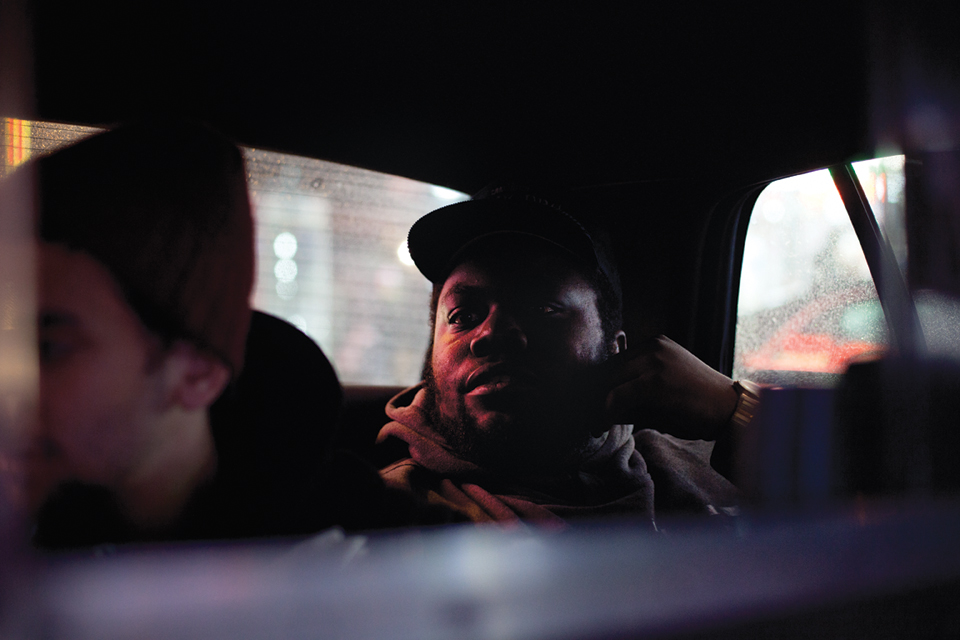
LOCATION: Brooklyn, New York
AGE: 21
GEAR: FL Studio
NOTABLE BEATS: Joey Bada$$’, “FromdaTomb$” and “Daily Routine”
SIGNATURE SOUND: A throwback to crisp and loud ‘90s New York rap
WHAT TO EXPECT IN THE FUTURE: A debut Pro Era Album, beats for Dom Kennedy, Flatbush Zombies and his own solo rap releases
Chuck Strangers’ favorite music was released when he was still in diapers. To him, Illmatic, Reasonable Doubt and Ready to Die represent an era in New York hip-hop when flipped soul samples and gritty drum loops underscored streetwise narratives and complex wordplay by young, dexterous MCs. Growing up in Flatbush, Brooklyn, he says, “I would listen to [those albums] on a CD player too big to fit in the pocket of my pants.” While his peers downloaded Dem Franchize Boyz singles, Strangers tried to perfect a ’90s New York flow. When friends scoffed at his early attempts at rapping, he turned to beatmaking. He begged his mom for an MPC for Christmas, and honed his craft by watching producers work on YouTube.
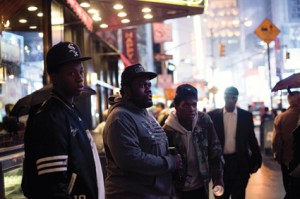 “When I first started making beats, everybody used to cut my ass,” he says. Still, eager to show off, he played his music in class in high school. “I was like, Fuck this, I’m Kanye. Listen to my beat that I made last night.” The whole class got quiet, and then they all started laughing at how bad it was. “[After that], when everyone was really bored, they’d be like, Yo, play some beats, we wanna laugh at your beats. That used to get me pissed, so I spent that whole summer just learning and trying to do my thing.”
“When I first started making beats, everybody used to cut my ass,” he says. Still, eager to show off, he played his music in class in high school. “I was like, Fuck this, I’m Kanye. Listen to my beat that I made last night.” The whole class got quiet, and then they all started laughing at how bad it was. “[After that], when everyone was really bored, they’d be like, Yo, play some beats, we wanna laugh at your beats. That used to get me pissed, so I spent that whole summer just learning and trying to do my thing.”
Meanwhile, in Strangers’ neighborhood, Joey Bada$$ and a legion of teenage rappers with a common affinity for New York’s golden age formed the Progressive Era crew. They caught word of Strangers’ work through mutual friends, and inducted him into the group as their in-house producer. On Joey’s breakout mixtape, 1999, Strangers’ laid-back “Daily Routine” beat flows seamlessly between instrumentals lifted from J Dilla and prolific New York producer Lord Finesse. Strangers is quick to point out, however, that Joey’s favorite boom-bap sound isn’t the only production style he’s capable of. “I really want to do some What’s the 411?, Mary J Blige-type R&B,” he says, “[and] I feel like me and Curren$y or Wiz Khalifa would do some ill shit.”
While hip-hop progresses into an Auto-Tuned wonderland, Strangers has made himself an exciting outlier. “I feel like some of the new rap music that comes out today just sounds like something else,” he says. “If they would have heard that back then, they’d be like, What the hell is this?” And for Strangers, perhaps discovering New York’s rap canon in a stack of old CDs awakened the same passion his predecessors felt as they rummaged through dusty record store crates.
FRANCES CAPELL
